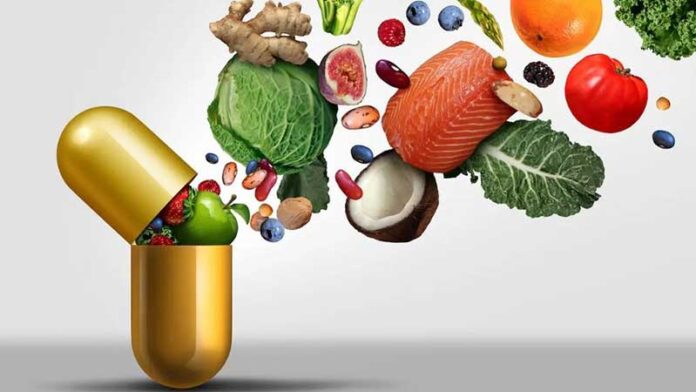Vitamins are organic compounds that are essential for the body and are usually taken orally or by injection.
Knowledge about when and how much to take vitamins is essential at any age. The body needs all kinds of vitamins, but there are many who refuse to eat fruits and vegetables containing vitamins, and their bodies suffer from a deficiency of these organic compounds, and they must compensate for this deficiency by consuming vitamins in a medicinal form.

The role of vitamins in the human body
Deficiency or lack of vitamins in the human body leads to disease in the body and causes irreparable problems. Vitamins increase metabolism and improve the function of body organs, and the result is the growth and health of people.
Fat soluble vitamins
These vitamins include vitamins A, D, K, E, which are fat-soluble. This group of vitamins are found in food sources and should be used with fats such as nuts and dairy products for better absorption in the body. It is recommended that these vitamins be taken at the same time as a meal.
Vitamin A
Sources of this vitamin include eggs, carrots, meat, beans, butter, cheese, spinach, fish liver oil, vegetables, peaches, melons, dates, cherries, bananas, and oranges. Vitamin A strengthens eyesight, improves cardiovascular efficiency, heals wounds and skin inflammations, increases the health of the respiratory and nervous system, digestive system, treats infections and warts, etc. Daily consumption of 0.7 mg is necessary for the body.
Vitamin K
Food sources such as green tea, cauliflower, lettuce, cheese, egg yolk, vegetables, mustard, meat, onion, spices such as turmeric, asparagus, red pepper, turnip are rich in vitamin K. Vitamin K is effective in preventing kidney stones, preventing cancer, arthritis, bone disorders, diabetes, jaundice, etc. It is recommended to consume 100 micrograms of this vitamin per day.
Vitamin E
Vitamin E is abundantly found in spinach, pumpkin, kiwi, shrimp, almonds, sunflower seeds, olives, salmon, and broccoli. Taking this vitamin protects against eye injuries, prevents cardiovascular diseases, cancer and Alzheimer’s. Doctors have recommended 15 mg of this vitamin daily.
Vitamin D
Fruits and vegetables, liver, eggs, sunshine, fish liver oil, cream, cereals, etc. are rich in vitamin D. It is used to prevent osteoporosis, rickets, Alzheimer’s and health and improve brain function. It is necessary for the body to consume 10 micrograms of vitamin D during the day.
Water soluble vitamins
Vitamin C and B are water soluble vitamins. This group exists in food sources. But its medicinal form is recommended to be taken on an empty stomach with water so that it is better absorbed in the body.
Vitamin C
Sources that contain this vitamin include tomatoes, strawberries, mangoes, potatoes, watermelons, tangerines, spinach, jujubes, red peppers, oranges, melons, lettuce, cucumbers, figs, eggplants, lemons, cantaloupe, grapes, bananas, He named carrots, apples, beets, apricots and pineapples. Vitamin C is useful for preventing blood cholesterol, cancers, blood clots, strengthening the immune system, strengthening teeth and gums, etc. Daily consumption of 40 to 120 grams is enough.
Vitamin B
Foods such as liver, meat, eggs, spinach, wheat bran, dates, dairy products, cereals, soybean flour, beans, and pumpkin are rich in vitamin B. This group also prevents the occurrence of cancer, cardiovascular diseases, health and beauty of skin and hair, weight loss, improvement of nerve function, improvement of inflammation, health of the digestive system, etc. It is recommended to consume 2 mg of this vitamin daily.

Time to take supplements
Magnesium is one of the essential supplements of the body that is consumed at night and causes insomnia. It is better to take iron tablets or iron supplements with vitamin C. On the other hand, iron should not be eaten with dairy products because dairy products prevent its absorption. Probiotics have a better effect half an hour before eating.
Of course, note that you should not take any of these vitamins and supplements without a doctor’s prescription. Arbitrary consumption of these substances causes serious harm to the body and can increase the risk of some diseases.










